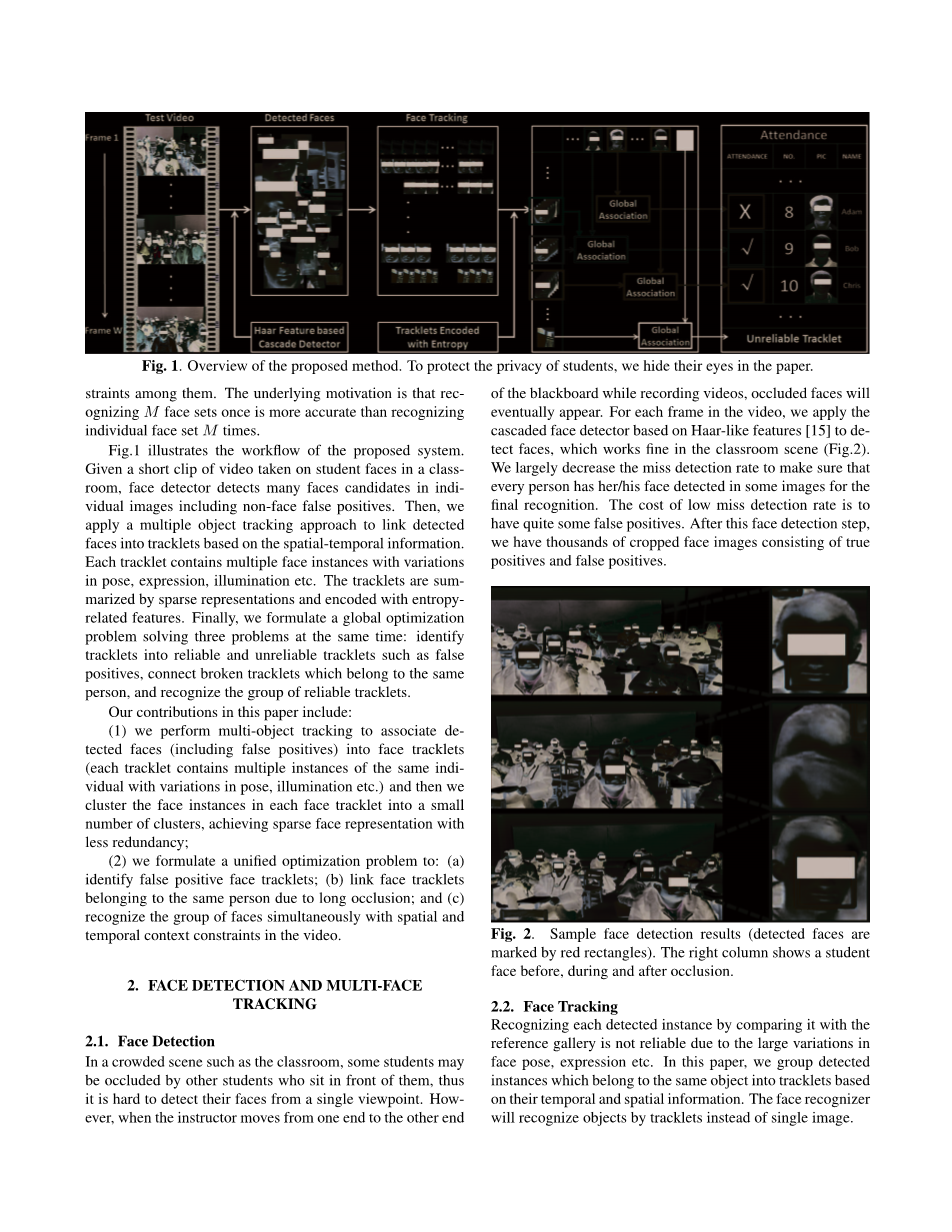

英语原文共 11 页,剩余内容已隐藏,支付完成后下载完整资料
WHO MISSED THE CLASS? - UNIFYING MULTI-FACE DETECTION, TRACKING AND RECOGNITION IN VIDEOS 1
2. FACE DETECTION AND MULTI-FACE TRACKING 3
3. RECOGNIZE A GROUP OF MULTI-INSTANCE TRACKLETS SIMULTANEOUSLY 5
3.2. Entropy-based Tracklet Feature 6
3.3. Global Tracklet Recognition 7
4.3. Face Recognition in Classrooms 10
全文翻译:谁逃课了?——视频中的统一多人人脸检测、跟踪和识别 12
4.2. 比较Honda / UCSD数据集上的单图像、Face Tracklet和Tracklet组的人脸识别 18
1.Face detection using representation learning 21
2. Robust Real-Time Face Detection 21
3. Research on Video Face Detection based on AdaBoost algorithm Training classifier 22
4. The Research of Face Detection Method Based on Adaboost Algorithm and Skin Color Segmentation 22
5. Face Recognition Using Laplacianfaces 23
6. Occlusion Robust Face Recognition Based on Mask Learning 24
7. Reading Faces:From Features to Recognition(review) 24
8. Research on Face Recognition Method Based on Deep Learning in Natural Environment 25
9. Robust Face Recognition via Adaptive Sparse Representation 25
10. Robust Face Recognition via Sparse Representation 26
WHO MISSED THE CLASS? - UNIFYING MULTI-FACE DETECTION, TRACKING AND RECOGNITION IN VIDEOS
Yunxiang Mao, Haohan Li, Zhaozheng Yin
Department of Computer Science
Missouri University of Science and Technology, USA
ym8r8@mst.edu, hl87c@mst.edu, yinz@mst.edu
ABSTRACT
We investigate the problem of checking class attendance by detecting, tracking and recognizing multiple student faces in classroom videos taken by instructors. Instead of recognizing each individual face independently, first, we perform multiobject tracking to associate detected faces (including false positives) into face tracklets (each tracklet contains multiple instances of the same individual with variations in pose, illumination etc.) and then we cluster the face instances in each tracklet into a small number of clusters, achieving sparse face representation with less redundancy. Then, we formulate a unified optimization problem to (a) identify false positive face tracklets; (b) link broken face tracklets belonging to the same person due to long occlusion; and (c) recognize the group of faces simultaneously with spatial and temporal context constraints in the video. We test the proposed method on Honda/UCSD database and real classroom scenarios. The high recognition performance achieved by recognizing a group of multi-instance tracklets simultaneously demonstrates that multi-face recognition is more accurate than recognizing each individual face independently.
Index Terms— Face detection, face tracking, face recognition, multiple object tracking, multiple object recognition.
1. INTRODUCTION
We are interested here in the class attendance checking by recognizing student faces in classroom images/videos taken by the instructor. Face recognition in images has been intensively researched in the past three decades [17, 21]. Usually, the workflow of image-based face recognition systems performs in the following steps: detect the human face in an image, compare the detected face with a reference dataset of N faces and classify who she/he is. This typical workflow builds face models/features for each individual person independently and recognizes each individual face. However, achieving high performance face recognition by using this “one face image versus N references” strategy is still a challenging problem due to the variation of facial expression, pose, illumination condition, occlusion etc. . In group photographs such as taking a short clip of video on studentsrsquo; faces in a classroom, we can explore video information to improve the face recognition performance.
全文共47759字,剩余内容已隐藏,支付完成后下载完整资料
资料编号:[12966],资料为PDF文档或Word文档,PDF文档可免费转换为Word


